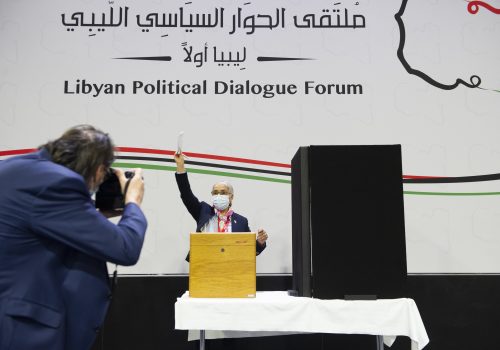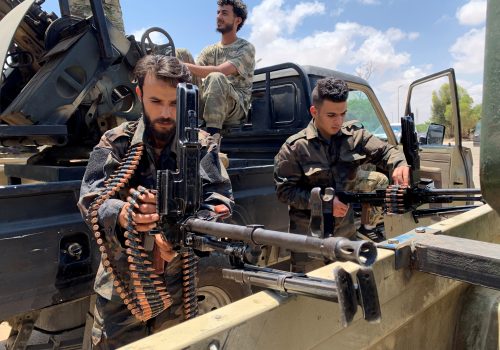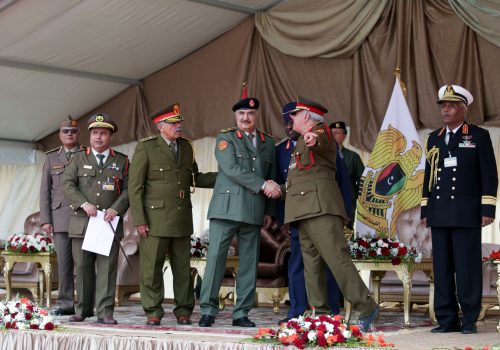Rewriting the rules of mediation and conflict resolution: The Libyan Political Dialogue Forum
After a decade, the upheaval unleashed across the Middle East and North Africa by the winds of the Arab Spring only seems to have a woeful lasting legacy: civil wars, counter-revolution movements, and instability caused by widening regional ideological rifts. The unbridled enthusiasm for the democratization of Arab states long bent by authoritarianism has now been replaced by a familiar indifference and apathy, especially as the voices and faces of the opposition continue to vanish.
It is under extremely challenging conditions in which United Nations (UN) envoys, such as Acting Special Representative of the Secretary-General for Libya for the UN Support Mission in Libya (UNSMIL) Stephanie Williams, are tasked with resolving conflicts. These challenges are further compounded by constantly evolving landscapes abetted by the international community’s ambivalence, UN Security Council disagreements, and alignments among warring parties imperiling the impartiality of mediators. It was inevitable that mediated talks on Libya would fail, as they were unable to exercise impossible dilemmas or maintain some flexibility in anticipation of the changing demands of negotiating parties. This is what makes Williams’ outstanding efforts to establish the Libyan Political Dialogue Forum in January extremely unique and truly impressive.
Ten years of initiatives failed to garner sufficient support from foreign governments beyond perfunctory nods acknowledging a flawed Libyan Political Agreement (LPA), ill-conceived roadmaps, or hasty calls for unity and reconciliation. On the other hand, for the Libyan spoilers and their regional backers, it became easier to ‘game’ the frequent international conferences, giving lip service to peace and unity, despite committing to their non-compliance in their actions. Additionally, most diplomatic efforts were thrilled by the simple desire to hold elections within months, disregarding that Libya lacks any of the infrastructure, political institutions, and legal framework needed to conduct them successfully.
It is under such complex conflict dynamics that Acting Special Representative Williams was not only expected to accomplish what had eluded five predecessors, but in a much different climate.
The Libyan Political Dialogue Forum
Libyan political elites sit at the very top, occupied by chasing foreign approval and elusive goals of reunification, reconciliation, and state rebuilding while acting as a kleptocracy. They draw their support and security from a second tier, filled with armed non-state actors and war profiteers who are far more interested in perpetuating the existing climate than committing to its end, thereby making UN mediation an existential threat. At the very bottom is the often ignored will of the Libyan people, exhausted by war and economic collapse.
In order to wade through such a complex maze, Williams attempted to establish a new precedent to mediation and conflict resolution. After realizing that the biggest obstacles to achieving a permanent settlement were the parliament, state, and presidency councils that came out of the Skhirat Agreement in 2015, it became clear that Libya needed an entirely new political institution. Its goals would be to fully create a Libyan-owned and Libyan-led solution, which culminated in the Libyan Political Dialogue Forum (LPDF).
The seventy-five-member LPDF, made up of a sample of Libyans chosen from varying shades of Libya’s society and demographics—based off of tribal affiliations, regions, ideologies, and many other determinations—make the group as diverse and inclusive as possible. By concentrating this among Libyans themselves, Williams’ approach excluded the influence and participation of external actors, as happened in Skhirat, where foreign governments and envoys inserted themselves and their interests in critical decisions as well as the selection of government officials.
With the LPDF, those roles are exclusively reserved for Libyans.
The outcome of the list
The candidates the LPDF eventually voted for on February 5, 2021 were a very diverse group and so were the four regional lists that came out of the run-off elections when the initial rounds of voting failed to pick the winners conclusively. The lists reflected different priorities and elements of Libya’s tiered society, such as rebuilding the state and achieving regional priorities.
The favorited list, which ultimately did not succeed, angled for realpolitik outcomes by trying to forge an alliance of prominent and hardened representatives from warring factions, such as Aguila Saleh, leader of the east’s House of Representatives, located in Tobruk under the protection of General Khalifa Haftar’s Libyan National Army; Fathi Bashagha, the interior minister of the UN-backed Government of National Accord (GNA); and rounded off by a prominent leader from Libya’s south, Abdul Majeed Saif al Nasr. This was also the most controversial list since the relevant ‘sides’ had grave concerns about Saleh’s support for General Haftar’s April 2019 siege on the capital, Tripoli.
Eventually, the LPDF elected the list led by Abdul Hamid Dbeibah—a former businessman with strong ties to Muammar Gaddafi—to the post of interim prime minister and Mohamed al-Manfi—former Libyan ambassador to Greece and from the east—as the head of a three-strong presidency council. Musa al-Koni, the GNA’s former deputy prime minister, will serve as Mohamed al-Manfi’s deputy, representing Libya’s south, with Abdullah al-Lafi completing the council. Their platform was the weakest, which is perhaps why the LPDF chose this group. So far, foreign countries have welcomed the formation of Libya’s first unified, caretaker government.
For now, Libyans are torn between embracing this fresh injection of optimism and a chance for reaching an ever-elusive final settlement or a familiar cynicism cultivated by numerous failures of similar processes over the years. The country may have narrowly escaped an opportunistic deal between familiar figures and engineers of the ‘lost decade’ from the east and west, but the new government is likely to struggle for recognition and legitimacy in parts of the country where they are less known. As novel as the LPDF is, there are still some unresolved issues that could continue to imperil reunification or make a permanent settlement practically impossible to achieve, making Libya ripe for a reviled partition, or worse—a very devastating military solution.
The new US administration is tasked with avoiding the latter without getting militarily involved in the country. The Geneva UN-led negotiations on the Libyan civil war could be a good case to follow. With that in mind, the Joe Biden administration should consider naming Williams as US Special Envoy to Libya to keep the momentum going for a political solution in Libya instead of this temporary but important, power-sharing agreement.
Hafed Al Ghwell is a non-resident senior fellow at the Foreign Policy Institute (FPI) of the Johns Hopkins University School of Advanced International Studies (SAIS).
Karim Mezran is director of the North Africa Initiative and resident senior fellow with the Rafik Hariri Center and Middle East Programs at the Atlantic Council.
Image: Overview of the first day of the Libyan Political Dialogue Forum at an undisclosed location, Switzerland, February 1, 2021. Violaine Martin/U.N. Photo/Handout via REUTERS


